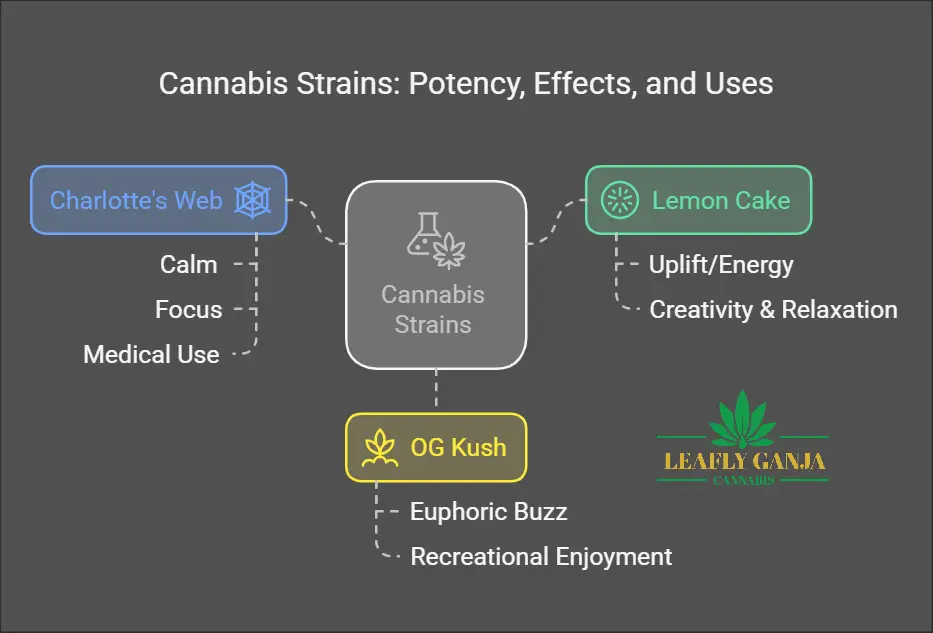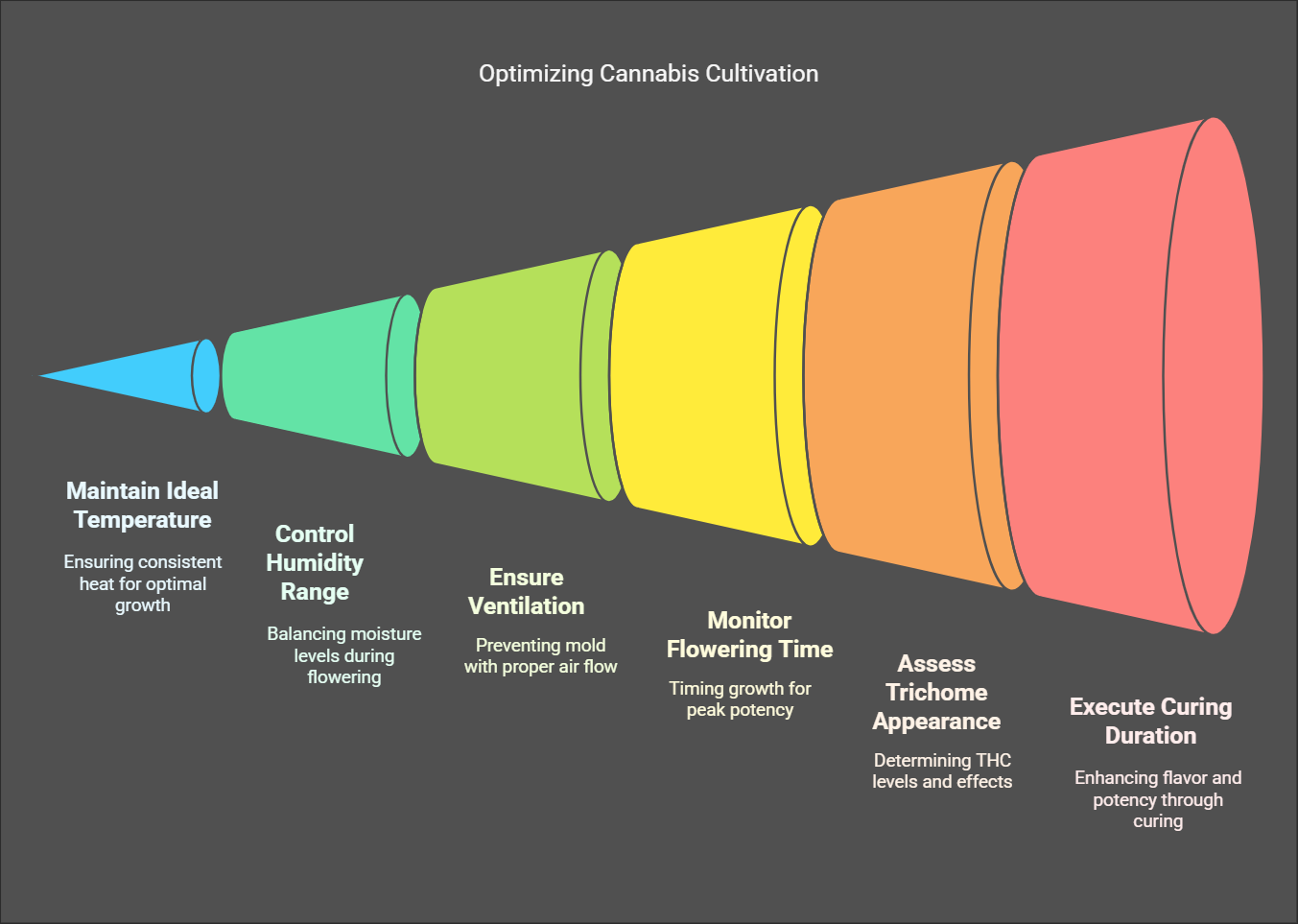Introduction
The Lemon Cake strain is a delightful hybrid that combines the best of indica and sativa. Known for its tangy citrus aroma and uplifting effects, it has quickly become a favorite among cannabis enthusiasts. Whether you’re seeking relaxation, creativity, or relief from stress, Lemon Cake offers a versatile experience that caters to a wide range of needs.

This guide explores every aspect of the Lemon Cake strain, including its origins, chemical makeup, effects, cultivation process, and how it compares to other popular strains. By the end of this article, you’ll have all the information you need to decide if Lemon Cake is the right strain for you.
Table of Contents
- What Makes Lemon Cake Strain Stand Out?
- Origins and Genetics
- Flavor Profile and Aroma
- Chemical Composition of Lemon Cake Strain
- THC, CBD, and terpene breakdown
- Effects on Mind and Body
- Consumption Methods for Optimal Experience
- Smoking vs. Vaping
- Edibles and Tinctures
- How to Grow Lemon Cake Strain
- Growing Conditions
- Harvesting Tips
- Comparison Table: Lemon Cake vs. Other Strains
- Potency and Effects
- User Preferences
- Consumption vs. Quality Analysis
- Dosage Recommendations
- Long-Term Benefits
- Frequently Asked Questions (FAQs)
- Common Queries About Lemon Cake Strain
- Conclusion
1. What Makes Lemon Cake Strain Stand Out?
Origins and Genetics
The Lemon Cake strain is a cross between Lemon Skunk and Cheese. This genetic combination results in a balanced hybrid with a 50/50 indica-sativa ratio. Its lineage gives it a unique blend of energizing and calming properties, making it suitable for various times of the day.
Flavor Profile and Aroma
True to its name, Lemon Cake boasts a zesty lemon flavor complemented by creamy undertones reminiscent of freshly baked cake. The aroma is equally inviting, with hints of citrus, sweetness, and earthiness. These sensory elements make it a favorite among users who appreciate nuanced flavors.
2. Chemical Composition of Lemon Cake Strain
THC, CBD, and terpene breakdown
Understanding the chemical composition of any cannabis strain is crucial for predicting its effects. Here’s a detailed breakdown of the Lemon Cake strain:
| Strain | Potency | Primary Effect | Best For |
| Mafia Funeral | High | Relaxation/Euphoria | Stress Relief |
| Charlotte’s Web | Low |
Calm Focus |
Medical Use |
| OG Kush | Medium-High | Euphoric Buzz | Recreational Enjoyment |
Understanding the Chemical Consumption
The chemical makeup of a cannabis strain determines its potency, therapeutic benefits, aroma, and flavor. We focus on three key components for the Lemon Cake strain: THC (tetrahydrocannabinol), CBD (cannabidiol), and terpenes. Each plays a unique role in shaping the user’s experience, and understanding these elements helps users make informed decisions about consumption.
1. THC (Tetrahydrocannabinol): 18-22%
What is THC?
THC is the primary psychoactive compound in cannabis, responsible for the “high” that users experience. It interacts with the brain’s endocannabinoid system, binding to CB1 receptors, which regulate mood, memory, appetite, and pain perception.
Why Does THC Matter in Lemon Cake?
With THC levels ranging between 18% and 22%, the Lemon Cake strain is considered moderately potent. This concentration ensures a noticeable psychoactive effect without being overwhelmingly strong, making it accessible to beginners and experienced users. The high THC content is what delivers the uplifting and energizing effects associated with this strain.
Effects of Moderate THC Content:
- Euphoria: Users often report feeling happy, uplifted, and mentally stimulated.
- Creativity Boost: Lemon Cake’s sativa influence enhances focus and creativity, making it ideal for brainstorming or artistic endeavors.
- Relaxation: While the initial effects are energizing, the Indica genetics provide a gentle body relaxation that helps users unwind without sedation.
Who Is This Suitable For?
- Recreational Users: Those seeking a balanced high combining mental stimulation and physical relaxation.
- Daytime Use: The moderate THC levels make it suitable for daytime use without causing excessive drowsiness.

2. CBD (Cannabidiol): <1%
What is CBD?
CBD is a non-psychoactive compound found in cannabis that does not produce a “high.” Instead, it is known for its therapeutic benefits, such as reducing inflammation, anxiety, and seizures. CBD also modulates the effects of THC, potentially mitigating some of its adverse side effects like paranoia or anxiety.
Why is CBD Low in Lemon Cake?
The Lemon Cake strain contains less than 1% CBD, indicating that it is not primarily intended for medical use cases requiring significant CBD concentrations (e.g., treating epilepsy, chronic pain, or severe anxiety). Instead, this strain leans more toward recreational use, focusing on delivering a balanced psychoactive experience rather than balancing THC with CBD for medicinal purposes.
Implications of Low CBD Content:
- Limited Medical Applications: While beneficial for mild stress relief and relaxation, Lemon Cake may not be suitable for conditions requiring high CBD levels.
- Enhanced Psychoactivity: The low CBD content allows THC to dominate, resulting in a more pronounced euphoric and uplifting high.
3. Terpenes: Limonene (0.5%), Myrcene (0.4%), Caryophyllene (0.3%)
What Are Terpenes?
Terpenes are aromatic compounds in cannabis (and many other plants) that contribute to the plant’s scent, flavor, and therapeutic effects. They work synergistically with cannabinoids through a phenomenon called the entourage effect, enhancing the overall experience. In Lemon Cake, the terpene profile is rich and diverse, contributing to its unique sensory and therapeutic qualities.
Key Terpenes in Lemon Cake:
- Limonene (0.5%)
- Aroma/Flavor Profile: Citrusy, zesty, and refreshing, reminiscent of lemons and oranges.
- Effects: Limonene is associated with mood elevation, stress relief, and anti-anxiety properties. It also has antibacterial and antifungal qualities.
- Role in Lemon Cake: Limonene is the dominant terpene in this strain, giving it its signature lemony aroma and flavor. It enhances the uplifting and energizing effects, making Lemon Cake perfect for combating fatigue or boosting creativity.
- Myrcene (0.4%)
- Aroma/Flavor Profile: Earthy, musky, with hints of cloves and ripe fruit.
- Effects: Myrcene is known for its sedative properties, promoting relaxation and sleep. It also enhances the absorption of THC, amplifying its psychoactive effects.
- Role in Lemon Cake: While myrcene adds a grounding earthiness to the flavor profile, it balances the energetic impacts of limonene by providing a calming undertone. This creates a harmonious blend of stimulation and relaxation.
- Caryophyllene (0.3%)
- Aroma/Flavor Profile: Spicy, peppery, and woody.
- Effects: Caryophyllene is unique because it interacts directly with CB2 receptors in the body’s immune system, offering anti-inflammatory and pain-relieving benefits. It also has potential anti-anxiety properties.
- Role in Lemon Cake: Caryophyllene adds depth to the flavor profile while providing subtle relief from inflammation or discomfort. Its spicy notes complement the citrusy brightness of limonene.
How These Components Work Together
The combination of THC, CBD, and terpenes creates a holistic experience that defines the Lemon Cake strain:
- Potency and Euphoria: The moderate THC content drives the psychoactive effects, delivering a balanced high that combines mental stimulation with physical relaxation.
- Flavor Complexity: The terpene profile—dominated by limonene, myrcene, and caryophyllene—gives Lemon Cake its distinctive taste and aroma, blending citrusy, earthy, and spicy notes.
- Therapeutic Benefits: While the low CBD content limits its medical applications, the entourage effect created by THC and terpenes provides mild stress relief, relaxation, and anti-inflammatory benefits.
Practical Implications for Users
Understanding the chemical breakdown helps users tailor their consumption based on personal preferences and needs:
- Recreational Users: Those seeking a balanced high will appreciate the moderate THC levels and vibrant terpene profile.
- Medical Users: Individuals looking for mild relief from stress, fatigue, or muscle tension may find Lemon Cake helpful, though strains with higher CBD might be better suited for severe conditions.
- Flavor Enthusiasts: Connoisseurs who value complex flavors will enjoy the interplay of citrusy, earthy, and spicy notes.
- THC: With THC levels ranging between 18% and 22%, Lemon Cake delivers a moderate to strong psychoactive effect.
- CBD: Low CBD content makes it less suited for severe medical conditions requiring high CBD concentrations.
- Terpenes: Limonene contributes to its citrusy aroma, myrcene adds sedative qualities, and caryophyllene provides anti-inflammatory benefits.
Effects on Mind and Body
The combination of cannabinoids and terpenes results in a multifaceted experience. Users report an initial burst of energy and creativity followed by a soothing body relaxation, making it ideal for social gatherings or creative projects.
3. Consumption Methods for Optimal Experience
Smoking vs. Vaping
Smoking remains one of the most popular ways to consume Lemon Cake. It provides immediate effects but may irritate the throat due to combustion. Vaping, on the other hand, preserves the delicate terpenes and offers smoother inhalation without compromising potency.
Edibles and Tinctures
For those seeking discretion or longer-lasting effects, edibles infused with Lemon Cake extract are an excellent choice. Tinctures, when administered sublingually, provide rapid absorption and precise dosing.
4. How to Grow Lemon Cake Strain
How to Grow Lemon Cake Strain
Growing cannabis is both an art and a science, and each strain has specific requirements for optimal growth. With its unique genetic makeup, the Lemon Cake strain requires careful attention to environmental factors, timing, and post-harvest processes to achieve the best results. Below, we’ll explore the two main aspects of growing this strain: growing conditions and harvesting tips.
| Aspect | Details |
| Ideal Temperature | 70-80°F (21-27°C) |
| Humidity Range | 40-50% (flowering stage) |
| Ventilation | Essential to prevent mold; use fans and exhaust systems |
| Flowering Time | 8-9 weeks |
| Trichome Appearance | Milky white = Peak THC; Amber = More sedative effects |
| Curing Duration |
2-4 weeks with daily burping for the first week |
1. Growing Conditions
Climate Preferences
The Lemon Cake strain thrives in warm climates, such as those found in Mediterranean regions. These areas typically have mild winters, hot summers, and plenty of sunlight—ideal conditions for cannabis cultivation. If you’re growing outdoors, ensure your location mimics these conditions, or consider using greenhouses to regulate temperature and humidity.
Indoor Growing Requirements
For indoor growers, replicating the natural environment is key. Here are the specific parameters you need to maintain:
- Temperature:
- Keep temperatures between 70-80°F (21 and 27°C). Cannabis plants are sensitive to extreme heat or cold. Temperatures below 65°F can stunt growth, while temperatures above 85°F may cause heat stress, leading to wilting or reduced yields.
- Humidity Levels:
- Maintain humidity levels at 40-50% during the flowering stage. High humidity increases the risk of mold and mildew, especially since dense buds like Lemon Cake are particularly susceptible. Use dehumidifiers or fans to control moisture levels.
- Ventilation:
- Proper airflow is crucial for healthy plant development. Stagnant air can trap moisture around the leaves and buds, creating a breeding ground for mold and pests. Install exhaust fans, oscillating fans, or air circulation systems to keep the air moving. This prevents mold and strengthens stems by simulating natural wind resistance.
Lighting Needs
Cannabis plants require ample light for photosynthesis, which fuels their growth. For indoor setups:
- Use high-intensity discharge (HID) lights such as metal halide (MH) for vegetative growth and high-pressure sodium (HPS) for flowering.
- Alternatively, LED grow lights are energy-efficient and produce less heat, making them ideal for smaller spaces.
- Ensure a consistent light cycle of 18 hours on/6 hours off during the vegetative stage and switch to 12/12 during flowering to trigger bud production.
Soil and Nutrients
- Soil Type: Use well-draining soil rich in organic matter. Avoid compact soils that retain too much water, as this can lead to root rot.
- Nutrient Schedule: During the vegetative phase, focus on nitrogen-rich fertilizers to promote leafy growth—transition to phosphorus- and potassium-heavy nutrients during flowering to support bud development.
2. Harvesting Tips
Harvesting at the right time ensures maximum potency, flavor, and yield. Here’s how to do it properly:
Flowering Time
The Lemon Cake strain has a flowering period of approximately 8-9 weeks. This timeline can vary slightly depending on growing conditions and whether you’re cultivating indoors or outdoors. Outdoor growers should aim to harvest in late September to early October, assuming they’re in a region with a temperate climate.
Trichome Observation
Examine the trichomes (the tiny, crystal-like structures on the buds) to determine the perfect harvest window. Trichomes contain cannabinoids like THC and CBD, and their appearance changes as the plant matures:
- Clear Trichomes: The plant is still immature; harvesting now will result in lower potency.
- Milky White Trichomes: This indicates peak THC levels. Harvesting at this stage provides the most potent psychoactive effects.
- Amber Trichomes: As trichomes turn amber, THC converts into CBN (cannabinol), which has more sedative effects. A mix of milky and amber trichomes offers a balanced experience.
Use a jeweler’s loupe or a digital microscope to inspect trichomes closely without damaging the plant.
Proper Curing
Once harvested, curing is essential for enhancing flavor, aroma, and shelf life. Follow these steps for adequate curing:
- Trimming: Remove excess leaves from the buds (wet trimming) or let them dry first (dry trimming).
- Drying: Hang trimmed buds upside down in a dark, cool room with 50-60% humidity and temperatures around 60-70°F (15-21°C). Drying typically takes 7-10 days.
- Jar Curing: Place dried buds in airtight glass jars, filling them about ¾ full. Open the jars daily for the first week (“burping”) to release excess moisture and prevent mold. Continue burping every few days for 2-4 weeks until the buds reach the desired texture and aroma.
Properly cured Lemon Cake buds will have a smooth smoke, rich flavor, and extended shelf life.
Practical Implications for Growers
Understanding these growing and harvesting practices allows cultivators to maximize the quality of their Lemon Cake crop. Here’s what each step achieves:
- Optimal Growing Conditions: Ensures healthy plant growth, robust yields, and protection against pests and diseases.
- Timely Harvesting: Captures the strain’s full potential in potency and effects.
- Curing Process: Enhances the sensory experience by preserving terpenes and improving overall bud quality.
5. Comparison Table: Lemon Cake vs. Other Strains
| Comparison Table: Lemon Cake vs. Other Strains | |||
| Strain | Potency | Primary Effect | Best For |
| Lemon Cake | Medium-High | Uplift/Energy | Creativity & Relaxation |
| Charlotte’s Web | Low | Calm Focus | Medical Use |
| OG Kush | High | Euphoric Buzz |
Recreational Enjoyment |
Each strain caters to different needs, but Lemon Cake delivers a balanced experience suitable for daytime productivity and evening relaxation.
6. Consumption vs. Quality Analysis
Dosage Recommendations
Beginners should start with small doses (e.g., 0.5g smoked or 5mg edible) to gauge tolerance. Experienced users can gradually increase intake based on desired effects.
Long-Term Benefits
Regular use of Lemon Cake may aid in managing mild anxiety, fatigue, and lack of focus. However, moderation is key to avoiding dependency.
7. Frequently Asked Questions (FAQs)
Q1: Is Lemon Cake legal?
A1: Legal status depends on your location. Always check local laws regarding cannabis use.
Q2: Can I grow Lemon Cake outdoors?
A2: Yes, provided you live in a region with a warm climate and sufficient sunlight.
Q3: Does Lemon Cake cause paranoia?
A3: While rare, some users sensitive to high THC levels might experience mild paranoia. Start slowly to mitigate risks.
8. Conclusion
The Lemon Cake strain is more than just another cannabis variety—it’s a sensory journey waiting to be explored. From its tangy flavor profile to its therapeutic benefits, this strain offers something for everyone. By understanding its chemical composition, optimal consumption methods, and cultivation requirements, you can fully appreciate what makes Lemon Cake truly special.
Whether you’re looking to boost creativity, relax after a long day, or enjoy a flavorful smoke, this strain promises unparalleled quality and satisfaction. So why wait? Dive into the world of Lemon Cake and unlock its secrets today!




